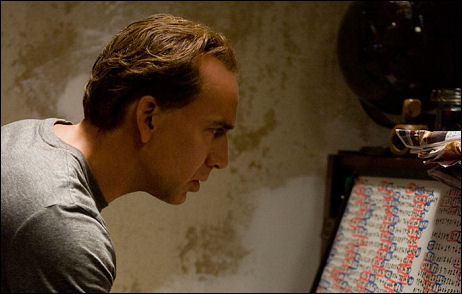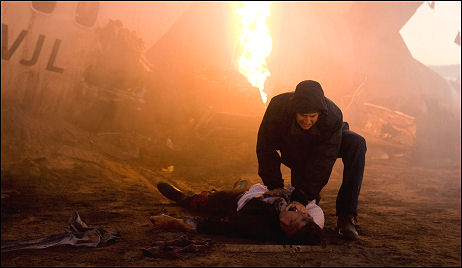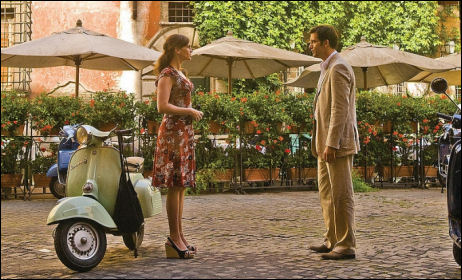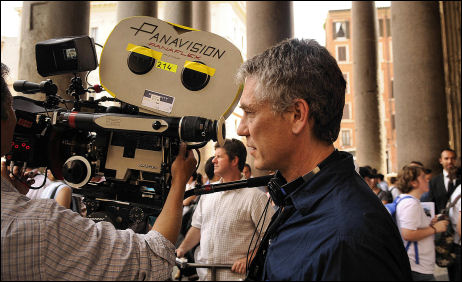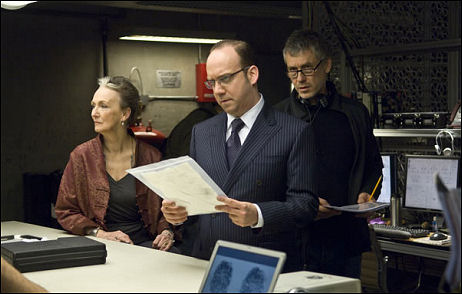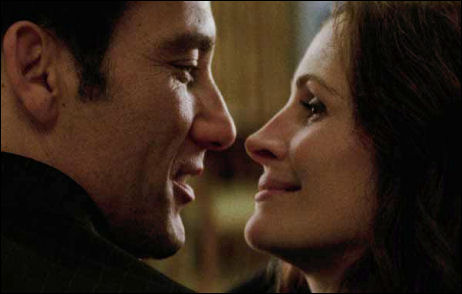Updated: Former Entertainment Weekly writer Chris Willman has written a fascinating account of Wednesday night’s confrontation at Santa Monica’s Aero theatre between Bound for Glory‘s David Carradine, Ronny Cox and Haskell Wexler. I posted a brief description of this yesterday (along with an mp3 file). Willman’s version is better. Note: I’ve just pasted the article below the photo.
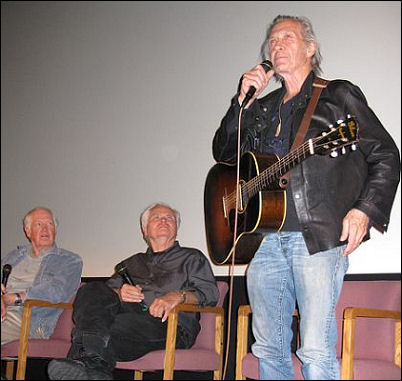
(l. to r.)
Bound for Glory costar Ronny Cox, moderator Kevin Thomas, star David Carradine
Bound for Hell, or Glory, at the Cinematheque by Chris Willman
Today at 3:35pm
Not since I saw Bill Irwin and Kathleen Turner go at each other in an excellent production of Who’s Afraid of Virginia Woolf? a couple of years ago have I experienced a night of live theater quite as riveting as the three-way cage match between David Carradine, Haskell Wexler, and the audience the other night following an American Cinematheque screening. I keep alluding to what a nerve-wracking, weird and wonderful night this was, and I’ve gotten asked to go into detail about how the proceedings unfolded, or unraveled. This is going to be way more exhaustive than most of you will want. But for the few who really wanted to hear about the whole thing, by request, here goes…
If there’s anything that doesn’t exactly seem to scream “fireworks!,” it’d be a panel discussion about the 1976 Woody Guthrie biopic Bound for Glory, which at this date probably counts as one of the less remembered works of the late, great Hal Ashby. As much as I love Ashby, I’d never seen it, and I have a hard time forcing myself to watch slow-moving two-and-a-half hour movies unless I’ve committed myself to a seat in front of a big screen. So I just barely dragged myself out of the house for the 30-mile drive to the Aero. I knew there’d be a discussion afterward with Carradine, but my plan was to skip out on it and go from there to a late show of Watchmen in Westwood. (Two two-and-a-half-hour movies in a row, you say? Well, that’s just the kind of tough guy I am.) But, imperfect as Glory is, it does a fantastic job of plunging you into the (previous) Depression, and it’s so utterly and engagingly human that I feel like washing its taste out of my mouth with a comic-book extravaganza would be opening myself up to eternal damnation. So I stay for the discussion, and narrowly avert what might have been one of the great regrets of my life.
I should say that there has already been some weirdness during the screening itself. During a scene where a radio guy reminds Guthrie that he’s not allowed to sing any controversial or topical material on his program, somebody very loudly exclaims, “I hate guys like that!” It gets a big laugh from the audience. But soon the same guy is keeping up with a line of patter, which I can’t make out because he’s on the other side of the auditorium. As you’d expect in a repertory screening, very quickly there are cineastes yelling at the rube to shut the hell up, and some kind of verbal altercation seems to ensue for about a minute. Of course, as soon as the lights come up, Carradine is walking down the aisle with his acoustic guitar, already going off on some kind of rant before he gets to the stage, and everyone realizes he was the one providing live commentary for his movie. (As the late noir character actor Lawrence Tierney once drunkenly did, in this same theater, in a night that is beloved in Cinematheque lore.) At this point I sense people in the audience feeling embarrassed to realize that The Star Of The Show had been shouted down like a common heckler, though some of these sympathies are about to diminish…
The screening is part of a “Kevin Thomas’ Favorite Films” series, hosted by the former (and occasionally still) L.A. Times film critic, who I knew back in my own Times days. I don’t know what Kevin has been like as a moderator on the other nights, but during the ensuing 70 or 75 chaotic minutes, he seems to go into shock and utters all of about 50 words. The first nine of them being: “I understand Ronny Cox is in the audience tonight?” Indeed, Carradine’s costar, Cox, has shown up just to see the film, and, so bidden, walks toward the stage–joining another surprise guest, Haskell Wexler, one of the half-dozen or so most revered living cinematographers, and an Oscar winner for the movie. Carradine and Cox warmly embrace, the former enthusing about how he couldn’t have gotten through without the latter as his partner, and the lovefest begins!
Or the monologue, actually. For the first 20 minutes or so, Carradine does 98% of the talking–hell, maybe 99%–and it’s entertaining as all-get-out, in a had-too-many-highballs-before-dinner kind of way. As the star goes on with his anecdotes, Cox is probably thinking he could have stayed in his original seat, and Wexler keeps slinking further down in his chair, as those of us who know this particular d.p. does not suffer fools gladly wonder what kind of storm clouds might be forming in his head. Wexler, who actually knew Woody Guthrie, does pipe up to say how wonderful a sign of change it was that Pete Seeger and Bruce Springsteen got to sing the full, controversial version of “This Land is Your Land” at the White House recently, which prompts Carradine to sing his own version of the tune, with the aid of some lyrical assists from the crowd. He talks about how Barbara Hershey convinced him to call his agent; about how Richard Dreyfuss was originally cast as Guthrie, but a salary dispute got in the way, and he was able to talk his way into the role by convincing producers that “I AM Woody Guthrie!” He took on this bravado despite the fact that, by his own admission, “the only thing I knew about Woody Guthrie when I was cast was that he wrote ‘Goodnight Irene.'” The punchline to this remark is supposed to be “I was wrong,” but Wexler, thinking Carradine doesn’t realize the mistake, perks up and steps on the actor’s joke, half-disgustedly interrupting, “No, Leadbelly wrote it.” Anyway, so far, so benign.
Then the subject of unions arises… and everything goes gonzo, never to return. Carradine says that these are different times from the 1930s and unions no longer serve the purpose they once did, or words to that effect. Cox, who has barely said a word up until now, starts shaking his head and says, “That doesn’t sound like Woody Guthrie to me!” Carradine starts trying to explain himself, when a woman in the back starts shrieking at him about how nothing about unions’ importance has changed. Carradine starts shouting back, which might’ve been okay if he wasn’t yelling right into the microphone, and it doesn’t sound pretty. The woman doesn’t let up, either, so for about two minutes both of them are going at it at once. She’s the more obnoxious one, but because he’s five times as loud, he’s coming off as the bully. Some audience members are telling Union Lady to shut up while others angrily holler “Let her speak!” A couple guys in my vicinity start shouting “Let’s hear from Haskell Wexler !” About a dozen people get up and walk out in the midst of this–one of them, almost unnoticed, being Cox, who makes the smoothest getaway of all time.
At this point, Carradine reminds me of poor Tucker Carlson, standing in front of that conservative PAC a few weeks ago, realizing that, in defending the New York Times, he has lost the sympathies of his audience to the hecklers, desperately trying to backpedal. A woman in the front row, who we will later learn is Cinematheque publicist Margot Gerber, stands up, turns around, and twice yells that the union shouter should be thrown out. But no, Carradine says, dissent is great. “You’re not one of the people!” shouts the lady. “I am one of the people!” Carradine shouts back, saying that he’s had to cut back on the groceries he buys for his family, and because of SAG’s actions, he can’t get work. “I AM NOT A RICH PERSON!” he growls, seemingly genuinely enraged as well as just loud for the first time. He talks about how it’s a problem when workers in Tennessee making Toyotas make $10 an hour while GM workers in Detroit make $60 an hour–which makes Union Lady even more outraged, naturally. Carradine says that everything we know is out the window in this economy and every aspect of what we’re willing to pay or be paid in our daily lives has to be up for renegotiation. It’s actually a good, lucid point, or would be if he had any control over his tone. Someone yells “Let her have the mike!” So Carradine half-heartedly tosses the mike into the audience–bonking a woman in the front row in the head! Ironically, the woman he bonks is the Cinematheque’s Gerber, who’d just been defending him moments earlier. This may count as some weird karma for her, but fortunately for Carradine, she’s probably the person in the audience least likely to file an assault charge.
The head-strike was an accident, but a groan goes up from the audience, because I think some people think he deliberately intended to lash out at the crowd, as opposed to just having really shitty aim. Suddenly it strikes me that it would only take one more bit of weirdness for things to get completely out of hand. It’s a holy cow, anything could happen right now kind of pregnant moment. Fortunately, there is slightly more confusion than hostility afoot, so no brawl ensues. Union Lady and her entourage finally take their leave, with Carradine shouting after her that he loves her, even though he knows she hates him.
There’s a moment of calm. Since the presumptive moderator is just sitting there, smirking and stunned, an audience member takes it upon himself to shout out a question about the cinematography. Who knew this would be a more dangerous subject than unions? Wexler talks about color desaturation (“You’ll notice the movie gets more colorful when we get to California”) and gives some technical specs. Carradine breaks in and starts talking about crane shots and suitcase cameras. Wexler, visibly irritated, goes back to the specs. And this is the point at which Carradine really kind of goes off the rails, albeit it in a subdued, passive-aggressive kind of way. He uses the line–which he repeats at least two or three more times–about how Wexler “got an Academy Award for ruining my movie.” You can feel the audience sort of collectively holding its breath as Carradine says the film “looks like it was shot through a glass of milk.” When he explains what he wished the look of the film had been, which is grittier, again, it’s a lucid point, but the way he’s making it is either tone-deaf or just evil.
Then he tells the story of how Ashby, the director, hated the look of the film, too, and was insisting on firing Wexler during the making of the film. I’m pretty sure I hear gasps go up at this point. Carradine says he talked Ashby out of firing him, “because if you fire somebody, they just go out in the parking lot and steal your hubcaps.” I’m pretty sure that’s a metaphor, but the audience doesn’t know what to do with this image other than to nervously titter. There will be a lot more of that–oh, yes, there will.
(It’s now, about 20 minutes from the end, that I come out of my own Kevin Thomas-like state of shock and realize that I should have been recording this whole fracas on my iPhone recorder app. So the remainder of these quotes are verbatim…)
Naturally, Wexler is enraged by Carradine’s story. So he retorts: “I didn’t know that I was going to be confronted with a story which I don’t think is necessarily a public story. But since it is public, I have to say something. Hal Ashby sent somebody to fire me, and he said, you’re fired, okay? And then after I heard that and got the message, I went to Hal and I said ‘Hal, just take a minute and STOP SNIFFING THAT STUFF UP YOUR NOSE!’ And if David will tell me there wasn’t heavy duty doping on that film, and that that wasn’t the comradeship he was talking about… When I showed up the next day, I went to work, and I was the UNFIRED director of photography. Now, that’s the goddamned truth!”
Carradine (drolly): “Okay. I don’t think that changes my story at all. Except that Haskell is a little down on people who snort cocaine.” That gets a good, nervous audience laugh. He goes on to tell a story about visiting Ashby’s mammoth trailer, and picking up a copy of the L.A. Times, which he hadn’t seen during many weeks of location shooting . “Underneath it there were about six lines of cocaine. … Hal was looking at me and I said ‘Hal, do you do a lot of this stuff?’ And he said ‘As much as I can get.’ And I said ‘I’ll talk to you later,’ and I left the trailer. Because it’s not my thing. And yes, Hal was a great user of cocaine. It does not change the fact that he was… ” He goes for the superlatives. “Quentin Tarantino doesn’t beat Hal Ashby, and he’s one of my favorite directors. Quentin is incredible. And he’s a big cocaine freak, too!” Okay, you want to talk about nervous laughter… (Just for the record, and to cover my ass. I’m not sure you can tell for 100% certain from the tape whether Carradine says the present-tense “He’s a….” or, possibly, the past-tense “He was a…” But I digress.) Carradine continues: “But Hal was a fucking genius. I don’t like anybody to put him down and say the drugs got in the way or anything else, because they didn’t get in the way. They got in the way of him living longer, but they did not get in the way of his movies. There is not one movie he made that you cannot say it’s one of the best fucking movies that has ever been made…”
He continued: “Hal was a fucking genius.” Okay, we get that part. “And so is this guy! I happen to disagree with the way he felt about Bound for Glory, about the look. And it was beautiful, but it was not what I wanted. I wasn’t the boss, right? … This guy was out there working his fucking ass off, there’s no doubt about it, right? And he wasn’t doing exactly what I would have asked him to do. I would have said, turn up the contrast, show the grit under the fingernails, don’t make any beauty about it, make it fucking ugly. And you know what, if he’d done what I told him to do, he would probably have not gotten his Academy Award, because it wouldn’t have been pretty. So maybe he was right and I was wrong…Somebody will talk to me about Haskell and I’ll say ‘Oh yeah, he’s the guy who got an Academy Award for ruining my picture.’ It’s one of my favorite lines, and it gets a laugh. And then I see the picture and I just forget all that. Because the picture is just so fuckin’ great. That’s the thing that’s amazing to me, is a collaboration between a director and a cameraman and a star who absolutely disagree with each other on almost everything, and yet they make a movie that will be a permanent fucking classic. Is that okay. Haskell?”
Long pause. Wexler: “I just want to say that after Bound for Glory I made three or four pictures with Hal Ashby.”
Carradine: “And I didn’t get to make one!” At last, we all agree, and can laugh together! (Even though Wexler’s not laughing.) Hooray!
The harmony is short-lived. Carradine talks about how the homeless camps they set up for the film were “livable” and attracted people from out of state who actually resided in these tents for a time. Wexler makes faces at the audience, suggesting that everything Carradine is saying is cuckoo. (He also made a coke-snorting motion at one point, though I can’t remember when. It might have been when Carradine said that an entire day’s worth of work was unusable because too much dust in the Dust Bowl scenes made the shots impenetrably murky, which Wexler was not buying at all.) Setting the stage for the next battle, Carradine waxes enthusiastic over the use of a hidden “suitcase camera” that allowed the crew to get great takes of the extras in the camp scenes, unaware that they were being filmed. This is when Wexler really begins to take offense again, thinking that Carradine is trying to give the camera operators credit for his work.
Carradine: “We had this incredible guy… Do you remember the name of the guy that was the handheld camera guy, that used the suitcase camera?”
Wexler (rising to righteous indignation): “Do I remember it? How do you think it got in this film, David? Who do you think planned it? Who did the shots? Look it, David, you fuckin’…”
Carradine: “I’m not talking about credit, I’m just asking for the guy’s name.”
“Wait a second, David…”
“What did I do? I just asked for the guy’s name.”
“Do they know what a director of photography does… ” Wexler goes on to list all the collaborative relationships a cinematographer has with other crew key members. “Hearing David with his explanations about all these cameras and the suitcase camera… Where the hell did you get all this expertise?”
Carradine (drolly): “Uh, I was there. My only question was, what’s the name of that guy who operated the suitcase camera?
“YOU WERE IN THE TRAILER TILL YOU GOT CALLED OUT!”
“Do you know it?”
“I didn’t come here for combat,” Wexler announces, deliberately, “but I also didn’t come out here to be demeaned for what my contribution to that film is.”
“Okay, anyway, since he doesn’t know the name of the guy,” Carradine goes on, getting a dig in, “he had a suitcase that had a camera in it and he could push it and make it go… ” Haskell buries his face in his hands as Carradine goes on a bit more about the glories of the suddenly contentious suitcase camera, which was so brilliantly operated by whatsisname.
Wexler: “I’m gonna give up now. First of all, half the shots in [those scenes] were not from the suitcase…”
Carradine: “Half of ’em!”
Wexler: “David, I don’t know if I can take any more of this bull.”
There is a very pregnant silence. Then Carradine picks up his guitar and starts into a long rendition of Bound for Glory’s title song, urging the audience to join in. There is a bare minimum of singing and clapping, but the audience is a little too stunned, if not alienated, for a “Kumbaya” moment.
Carradine starts packing up his guitar, a process that mysteriously seems to go on for minutes as the actor tries to put a more gracious cap on the evening. “We never agreed, we’re sort of like enemies, but the fact is, I know his fuckin’ talent, and I know his drive and insistence on making the movie the way it was that got him his Academy Award…. I wish that I’d been able to work with you again. The fact that we don’t get along has nothing to do with it, nothing whatsoever. I got along great with your kid! I’m honored to be here. And anybody else that ever wants to do an event for Bound for Glory, I’ll be there.”
And I’m pretty sure Wexler and Cox won’t.
Just in time to send everyone home, Kevin Thomas finds his voice: “I must say, I’ve got some fresh insights into the collaborative effort of filmmaking.” It’s an arch comment, but it has some truth to it. As the audience stands to regain its collective existential bearings, Wexler turns to Carradine and says, “I knew you would not disappoint,” and (incredibly, after the passions that have just transpired) they briefly hug.
Outside on Montana Ave., clusters of attendees form. Metaphorically, or maybe literally, I think we’re all just trying to pat down the hair that’s been standing on end for the last hour. “Between the aggressive panelists and audience and a moderator who wouldn’t stop anything, it was a perfect storm,” announces one guy, gratefully, I think.
One stranger I catch up with on the corner says he found the entire experience to be a deeply uncomfortable immersion in unalloyed anxiety,; his friend counters that it was an exhilarating look past the usual curtain of Hollywood bullshit. Me, I have to go with… both. Either way, I suspect the 40 or 50 of us who stuck it out, like survivors of some massive accident, will be invisibly bonded in forever hereafter experiencing reality through a slightly different, somehow more knowing prism than the untraumatized loved ones to whom we return.


